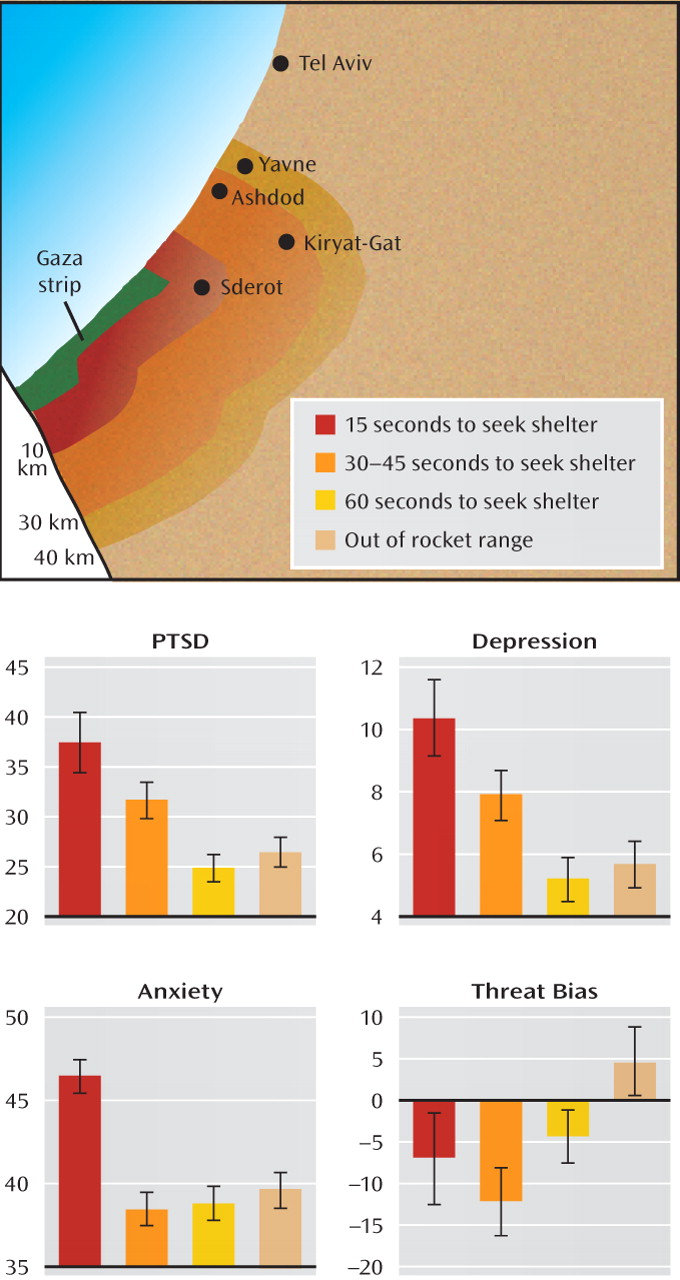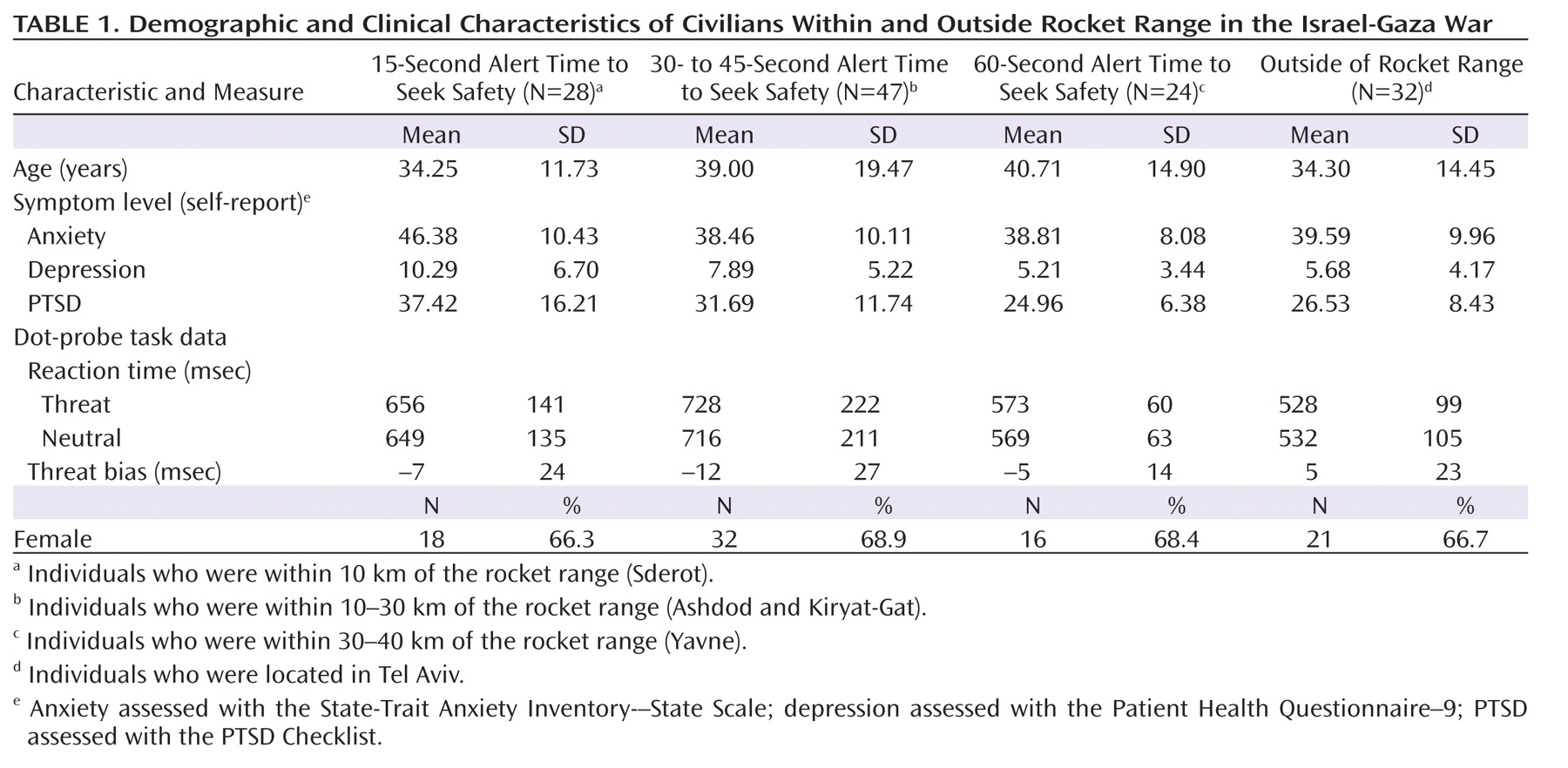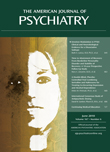The impact of traumatic stress is typically studied in the aftermath of violent incidents (
1–
7). However, virtually nothing is known about the acute symptomatic and cognitive correlates of traumatic stress, as manifest in real time, during life-threatening danger. This is due to the practical and ethical challenges researchers face when attempting to collect data in such situations, coupled with difficulties in quantifying the severity of threat in a graded fashion. Here, for the first time, we were able to assess the interplay among gradations of actual, imminent life-threatening danger, individual differences in stress-related symptoms, and attention to threat in humans.
With the outbreak of the Israel-Gaza War on December 27, 2008, civilians on both sides of the conflict experienced a sudden, dramatic increase in life-threatening danger. The immediacy of threat on the Israeli side rose in a graded fashion, as a function of proximity, throughout a 40-km area near the Gaza Strip. This reflected gradations in the physical and temporal proximity of threat (
Figure 1). Residents of southern Israel, located within 10 km of the Gaza Strip, encountered proximal threat cues, such as exposure to blasts, property damage, and casualties. Importantly, these residents had only 15 seconds to enter protected space after hearing alert sirens indicating imminent rocket attack and were also exposed to mortar shelling to which no alert signal was provided. Residents within 10–30 km encountered fewer threat cues, were out of mortar fire range, and had a 30- to 45-second warning time to seek shelter from rocket attacks. Residents within 30 to 40 km encountered still fewer such cues and had a 60-second alert signal.
Using standard self-report instruments, we measured symptoms of posttraumatic stress disorder (PTSD), depression, and anxiety as a function of war-related stress, operationalized as the time available for seeking cover from rocket attack. We also collected a behavioral measure of threat-related vigilance using a classic dot-probe attention task (
8). It is commonly assumed that life-threatening danger heightens vigilance to threat. However, laboratory-based studies actually suggest more complicated relations among stress exposure, threat vigilance, and individual differences in stress responding. This research suggests that very mild, experimentally induced stress can increase vigilance, but as stress increases in magnitude, it can have opposite effects, leading to avoidance of threat (
9–
15). For instance, various studies have shown that socially anxious individuals show an attentional bias away from threat only when observed under conditions of social-evaluative threat (e.g., before giving a speech) (
9–
11). Similar suppressions of threat bias were found in snake-fearful participants when exposed to a live snake (
13) and in combat veterans with PTSD under conditions involving a future threat of watching a combat video (
12). However, all of these investigations used relatively mild stressors. Virtually nothing is known about the interplay among more severe real-life stressors, clinically relevant distress, and threat vigilance.
Based on previous reports (
2), we expected to find increased symptoms of PTSD, depression, and anxiety among participants who had shorter periods of time to respond to threat. We also expected that severe life threat would result in suppression of threat-related attention bias indexing threat avoidance and dissociation.
Method
Data Collection and Sample
The present study was approved by the Tel Aviv University Institutional Review Board. Access to participants was obtained through contact with families of students, living in the affected cities, in an introduction to psychology class. These students served as recruitment liaisons and accompanied our research team in data collection at each city. After the procedures had been fully explained, all participants >18 years of age and parents of participants <18 years of age provided written informed consent. Participants <18 years old provided assent. A total of 131 participants were recruited from urban populations (mean age=37.3 years [SD=16.10]; range=15–75 years; men: 33%). Of these, 99 were within the 40-km rocket range: 28 were within 10 km (Sderot), 47 were within 10–30 km (Ashdod and Kiryat-Gat), and 24 were within 30–40 km (Yavne). Thirty-two participants were from outside the rocket range (Tel Aviv). Data were collected over a 6-day period between January 3 and 8, 2009, during the height of the conflict when tens of rockets were fired and siren alerts were frequently sounded. Data were collected in participants' apartments (N=123), public meeting spaces (N=6), and bomb shelters (N=2). Inclusion criteria were >15 years of age and literacy in Hebrew. Although we could not perfectly control the environment in which the experiments were conducted, we did verify that participants were comfortably seated while completing the questionnaires. The dot-probe task was administered to all participants on a standard set of identical laptop computers (15-inch screens). A research assistant was present at all times to assist with the tasks and monitor the integrity of the procedure. Because of the stressful nature of the data collection, some of which was conducted under actual rocket fire, it was not possible to ensure equal numbers of male and female participants. Finally, because a diagnosis of dyslexia or attention deficit hyperactivity disorder (ADHD) might have implications for performance on the dot-probe threat attention task, participants who reported being diagnosed with dyslexia or ADHD were excluded from the analyses associated with this attention task. It was not feasible to conduct a comprehensive psychiatric assessment under the unusual circumstances of the study.
Mental Health Outcomes
Symptoms of PTSD were evaluated using the 17-item National Center for PTSD Checklist of the Department of Veterans Affairs (
16,
17). Symptoms were related to any stressful experience (in the wording of the "specific stressor" version of the checklist). A clinical cutoff score of ≥50 was applied to determine the presence of clinically significant PTSD (
18). Depression was measured using the 9-item self-report Patient Health Questionnaire (
19–
21). The clinical cutoff for this measure was determined at a score of 10 (
22). State anxiety was measured with the 20-item State-Trait Anxiety Inventory (
23).
Threat-Bias Assessment: Dot-Probe Task
In the dot-probe task, two words, one threat-related (e.g., DEAD) and one neutral (e.g., DATA), are shown briefly in each trial, and their removal is followed by a small probe in the location previously occupied by one of the stimuli. Participants were required to respond as quickly as possible to the probe without compromising accuracy. Response latencies to the probe provided a snapshot of the distribution of participants' attention, with faster responses evident for the attended location relative to the unattended location. Attention bias toward threat is revealed when participants are faster to respond to probes that replace threat-related stimuli rather than neutral stimuli. The opposite pattern would indicate avoidance of threat stimuli (
24).
Threat-related vigilance was evaluated using a Hebrew-adapted version of the classic word-based dot-probe task (
8,
25). Stimuli were 38 threat/neutral word pairs. Within each pair, word length and frequency of usage in the Hebrew language were matched. Ratings of emotional valence by 18 independent judges were used to confirm that threat words were consistently rated as negative and neutral words as neutral. The task consisted of 152 trials in which threat/neutral word pairs were presented in a randomized order. Each trial began with a centrally presented fixation display ("+++" [display time: 500 msec]), immediately followed by a vertically aligned word pair written in 1-cm high white block text (display time: 1,000 msec). One word appeared directly above the location vacated by the preceding fixation signal, while the other appeared directly below. A distance of 3 cm separated the two words. The word pair was then replaced by a target probe that appeared in either of the two locations vacated by the words. Probe type was either a pair of dots or a single dot, determined randomly in each trial. Participants were required to identify which of the two probe types appeared by pressing the corresponding key as quickly as possible without compromising accuracy. The participant's response cleared the screen, and the next trial began 500 msec later.
Trials with incorrect response and trials in which the response time was two standard deviations of the participant's mean for a particular condition were excluded from subsequent analysis (<2% of all trials). Threat bias was calculated as the difference between the average response time to targets in neutral word locations and those in threat word locations. Positive bias values represent attention bias toward threat, whereas negative bias values reflect an attentional bias away from threat.
Threat-related attentional biases in anxious and nonanxious populations have been rigorously studied using the dot-probe task. There is broad consensus that performance on this task provides a reliable and valid measure of a participant's attention bias. Specifically, it has been demonstrated through narrative and quantitative meta-analytic reviews (
24,
26,
27) that the dot-probe task generates consistent associations with individual differences in anxiety, rendering significant medium effect sizes of threat bias in anxious individuals. Dot-probe studies have been conducted with diverse populations, including individuals with clinical and subclinical anxiety, patient and normative samples, and children and adults (
24). And, most relevant to the present study, the dot-probe task has been used to demonstrate threat-related bias in participants with PTSD (
28–
30) and has proven to be sensitive to situational stress in laboratory-based studies (
9,
15). Split-half reliability of the dot-probe task in the present sample was highly significant (reaction times for neutral and negative trials: all r values=0.99, df=111, all p values <0.0001; bias score: r=0.45, df=111, p<0.0001).
Statistical Analyses
Outcome variable scores (PTSD Checklist, Patient Health Questionnaire–9, State-Trait Anxiety Inventory) were separately subjected to univariate analyses of variance (ANOVAs), with situational stress (15-second alert, 30- to 45-second alert, 60-second alert, and no threat) as a between-subjects factor. Follow-up Scheffe contrasts were computed to clarify the nature of main effects. Reaction time data from the dot-probe task were subjected to repeated-measures ANOVA, with situational stress as a between-subjects factor and target location (threat, neutral) as a repeated within-subject measure. Threat bias scores were calculated as mean reaction time for targets in neutral word locations minus mean reaction time for targets in threat word locations to simplify presentation of a significant situational stress-by-target location interaction effect (Figure 1). Once again, follow-up Scheffe contrasts were computed to clarify the nature of main effects. In addition, we computed a correlation between threat bias and self-reported negative emotional symptoms. Negative emotional symptoms were indexed by a combined symptom measure, created by averaging the z scores from the PTSD Checklist, Patient Health Questionnaire–9, and State-Trait Anxiety Inventory–State Scale.
Results
PTSD and depression symptoms increased as a function of threat (i.e., shorter warning to seek shelter) (PTSD: F=6.77, df=3, 129, p<0.0001; depression: F=5.80, df=3, 129, p=0.001) (Figure 1). Follow-up contrasts indicated that PTSD and depression symptoms were equally low in participants outside of rocket range and participants who had 60 seconds to seek shelter. However, each additional reduction in alert time was mirrored by significant increases in symptoms. This pattern was mirrored by percentages of participants falling above clinical cutoff scores for PTSD (21.4%, 10.9%, 0%, and 3.1% for the 15-second, 30- to 45-second, 60-second, and no threat zones, respectively; χ2=8.98, df=3, p=0.03) and depression (51.9%, 37.0%, 12.5%, and 15.6% for the 15-second, 30- to 45-second, 60-second, and no threat zones, respectively; χ2=13.78, df=3, p=0.003). State anxiety was highest in participants who had only a 15-second warning to seek shelter, whereas having at least 30 to 45 seconds for doing so resulted in significantly lower levels of state anxiety (F=4.14, df=3, 129, p<0.008), which was not different from being outside of rocket range altogether (Figure 1).
As seen in
Table 1, analyses of the attention task data revealed 1) a main effect for target location, such that reaction times to targets appearing in threat locations (mean reaction time=621 msec [SD=168]) were slower than reaction times to targets in neutral locations (mean reaction time=617 msec [SD=157]) (F=4.04, df=1, 110, p<0.05), and 2) a main effect of situational stress (i.e., time to seek shelter) (F=10.03, df=3, 110, p<0.0001). These effects were subsumed under a significant target location-by-situational stress interaction effect (F=2.86, df=3, 110, p<0.04). Specifically, participants living in cities under attack displayed a 5- to 12-msec attention bias away from threat, whereas participants living outside of rocket range displayed a 5-msec bias toward threat (Figure 1). To further explicate the main effect of situational stress on raw reaction time patterns, post hoc contrasts were computed. These analyses revealed that the raw reaction times of the participants who had 15 seconds to seek shelter and the raw reaction times of the participants who had 30–45 seconds of alert time were of similar magnitude (threat trials: p=0.61; neutral trials: p=0.69). In contrast, the reaction times of these two groups of participants (i.e., those who had <45 seconds to seek shelter) were significantly slower than those who had a 60-second alert time or who were outside of rocket range all together (p<0.003).
Finally, for participants within rocket range, threat bias inversely correlated with a combined distress index (computed as the averaged z scores for PTSD, depression, and anxiety scales) (r=–0.22, df=81, p<0.05), such that as bias away from threat increased (became more negative) distress symptoms became greater. No correlation between threat bias and the combined distress index emerged for participants living outside of rocket range (r=0.11, df=30, p=0.56).
Discussion
Research on the consequences of extreme threat typically involves data collection in the aftermath of a violent incident as opposed to data acquired in real time in the context of life-threatening circumstances (
1–
4). In this study, we present novel data on the impact of war-related stress gathered during an ongoing rocket attack. Our data indicate a stepwise decline in PTSD and depression symptoms as a function of decreasing threat imminence, as roughly indexed by the amount of time available to seek shelter during a rocket attack. These results are akin to reports of increased PTSD and depression as a function of physical distance and level of exposure to the 9/11 attacks (
2). The reaction time data add to a growing literature on the plasticity of attention bias to threat in highly anxious adults and children when studied under situations that provoke increases in state anxiety (
15,
31,
32). We also found that state anxiety was specifically elevated in participants who had a very short time to seek safety but not in participants who had slightly longer intervals to prepare for an imminent attack. Taken together, these findings relate variations in objective threat level to variations in sense of control and available coping resources (
33).
Our data indicate that individuals exposed to severe life-threatening risks manifest avoidance of, rather than vigilance toward, negative valence information. This pattern is in accord with previous laboratory reports using mild threat induction protocols (e.g.,
12,
15). However, there appears to be a price for such avoidance in increased symptoms of psychopathology. Indeed, considerable research on the stress response suggests that extreme reactions may be adaptive in the short-term but associated with deleterious outcomes in the long-term (
12,
34).
We also found that raw reaction times of participants who had <45 seconds to seek shelter were generally slower than raw reaction times of participants who had 60 seconds to do so or who were outside of rocket range. These results are congruent with established reports of a general psychomotor slowing in depressed and PTSD patients (
35–
37) and with the fact that higher depression and PTSD symptoms were found among participants who had less time to respond to threat in the present study.
The interpretation of our findings should be considered in light of limitations to the study. First, despite our effort to implement standardized experimental conditions, we could not perfectly control the physical environments in which the assessments were conducted because of the special circumstances of the study. Nevertheless, secondary analyses suggested that this was unlikely to account for the associations we observed. Second, although the entire situation of being in a war zone and under repeated rocket attacks was considered stress exposure (with graded severity as a function of time to seek shelter), the interval between actual data collection and the exact timing of a rocket attack varied across participants. Third, our results focus on the associations among stress, attention to threat, and symptoms collected at one point in time. It will be important for future studies to track such associations prospectively to clarify the degree to which the direction of associations among attention and various distress measures remains stable or shows signs of change. Finally, to maintain consistency with prior research relating between-group differences in stress to differences in attention, we used the dot-probe task to assess attention bias toward threat. Future investigations might consider the degree to which other attention tasks generate similar or different findings.
In summary, findings from the present study challenge current thinking about the role of attention in response to acute threat. These data may be useful for those interested in treating clinically significant posttraumatic reactions by facilitating adaptive changes in attention.



